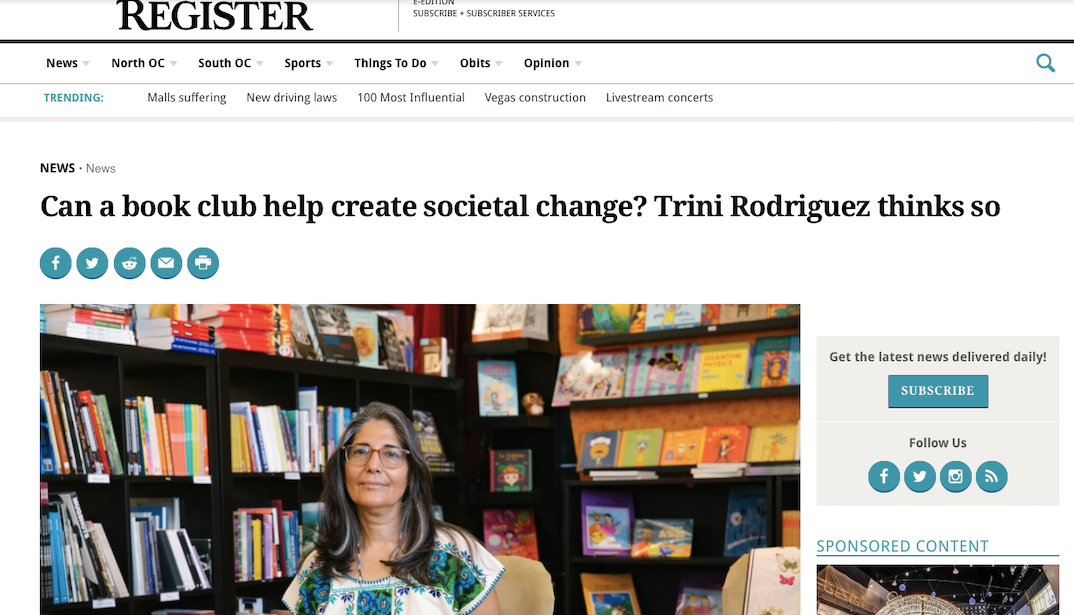To me, social justice is collective wellbeing for everyone. The abundance of creative spirit in all of us and the wealth of material resources that exist are enough to bring about the needed social change. But first we have to be clear that we need this change, we deserve this change, and that we should not accept anything less for ourselves or future generations.
This is what inspired my husband and me to co-found Tia Chucha’s in 2001. We had just returned from living in Chicago for over 15 years, where poetry and arts and music festivals and bookstores were vibrant and accessible everywhere. We had experience how the arts were integral to enjoying a full and imaginative life. We were crestfallen that the northeast San Fernando Valley, where I had grown up and where we chose to bring our two boys to live and reconnect with family, was a virtual arts and culture desert! Our communities were apparently not important to creatively invest in. For our own sanity, we dared to dream and risk big. We pulled our personal resources together and rallied relatives and community to help us bring Tia Chucha’s into existence.
As a co-founder and current board member, it’s very satisfying to see how Tia Chucha’s continues to evolve and grow today. The importance of having this hub for wellness and empowerment of our area’s historically neglected communities can’t be overstated.
What role does reading have in activism?
Activism is only as effective as it is informed. The impulse to rise in response to injustice is an important indicator of our humanity. Just as important is a deep understanding of the reality we are facing and what it requires of us to change it. The social problems we are witnessing on our screens and in our lives have systemic roots and require systemic solutions. Reading can help us grasp the fullness of what we are dealing with and awaken our resolve to transform the world in whatever ways our innate gifts can.
What kind of conversation can people expect at the book club?
The book club is designed to be led by the participants that join the meetings. Participants decide together on a different book every month, and our bookstore accommodates the group request. We get introduced to new books this way and the books selected relate to the interests of the folks who attend. We encourage folks to join the meetings if they’ve read the book, have not finished reading it or haven’t read it at all because, regardless, social justice issues and topics relate to us all. The book club is free; we just ask folks to come with an open mind and have critical conversations.
You can expect the discussions to be personally insightful, educational, resourceful and inspiring. Together we learn from the books we read and the discussions we share! We’re grateful to have met so many amazing people from our community and beyond.
How has the covid-19 pandemic affected your book club?
Tia Chucha’s is located in Sylmar, a neighborhood with the second largest number of people who have tested positive for COVID-19 in the San Fernando Valley, so the pandemic has severely impacted area residents and our operations. We have had to close our physical space since mid-March, but to continue serving our high-needs communities we have adapted our programming to offer much of it online.
Our book club is currently a virtual program. Using Zoom and Instagram allows us to connect with many more people from across the United States.
What books have you already read together, and what books are upcoming?
We have read a variety of books, including nonfiction, fiction, poetry, anthologies, etc., with themes of feminism, race, gender studies, abolition, immigration, capitalism, Latinx/AfroLatinx/Black history/narratives, and more.
Some of the titles we’ve read include “Citizen” by Claudia Rankine; Chimamanda Ngozi Adichie’s “Dear Ijeawele” and “We Should All Be Feminists”; “Reading Lolita in Tehran” by Azar Nafisi; and Carlos Gil’s “We Became Mexican American: How Our Immigrant Family Survived to Pursue the American Dream.”
Most recently … we discussed “Pagans in the Promised Land: Decoding the Doctrine of Christian Discovery,” by Steven Newcomb. Next up for August 15 we have “Make a Poem Cry: Creative Writing from California’s Lancaster Prison,” edited by Kenneth E. Hartman and Luis J. Rodriguez.
How do we sign up?
Tia Chucha’s social book club meets every third Saturday at noon, Pacific Time. Anyone interested in getting monthly updates on the Social Justice Book Club can email our program coordinator Andrea Lopez at andrea@tiachucha.org. People can also follow us on our social media pages like Instagram, Facebook, and our website at www.tiachucha.org to find out about upcoming book club meetings and other programs.
Copyright © 2022 MediaNews Group





